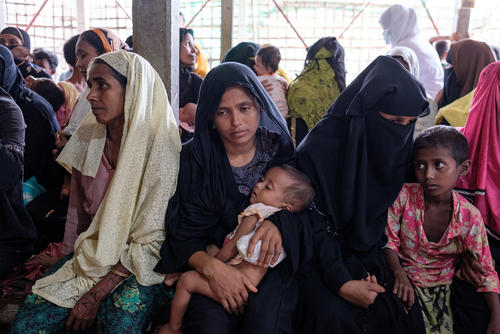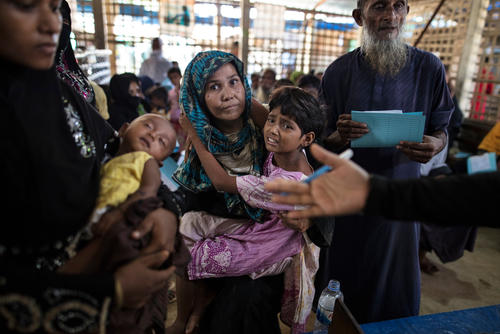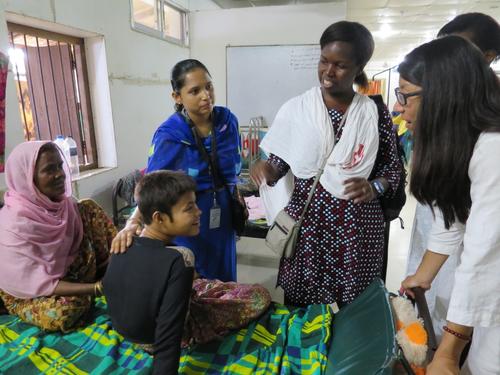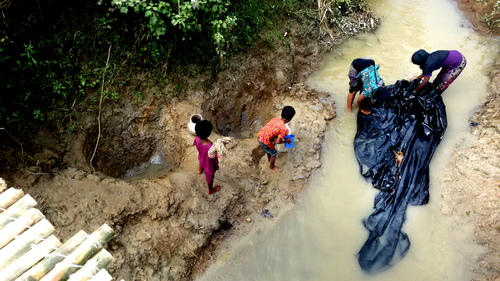Australian emergency medical coordinator for Médecins Sans Frontières, Kate White, reflects on how the Rohingya refugee crisis in Bangladesh has changed in recent weeks.
In a relatively short time, MSF has gone from having one in-patient facility in Kutupalong and one health post in the makeshift settlement, to now having two in-patient facilities and 15 health posts to assist the 620,000 Rohingya refugees that have settled in Bangladesh.
We now have a dedicated team monitoring and responding to new influxes coming through the border. New arrivals are sitting in what looks like a traditional rice paddy field. They’re waiting along the edges, surrounded by water. At any time, there are between hundreds to thousands of people unable to move forward.
When they’ve finally crossed, our teams begin initial medical assessment. Most medical issues we’re seeing are to do with the fact that people have walked for more than 10 days before arriving. We’re seeing cases of severe dehydration; injuries sustained during the crossing; and vulnerable children and pregnant women. Our team is offering real human support, reassuring new arrivals that we understand, we know what they’ve been through to get here, and we’re prepared to listen. That contact alone makes a massive difference.
“The possibility of a public health emergency is still very real”
The situation is still precarious and the possibility of a public health emergency is still very real. But, MSF is taking proactive measures to improve the conditions. Our water and sanitation teams are significantly increasing the number of latrines, tube wells and hand pumps. Our boreholes are at least 100 meters deep to prevent contamination in the drinking water. Plus, our outreach teams are mapping where patients are coming from so that we can look at improving the water, sanitation and hygiene conditions specifically in that area.
Unfortunately, we have already seen a significant number of children with complicated measles cases. Normally, you wouldn’t isolate a child who doesn’t have severe complications, but we have had to in this case. The low vaccination coverage in Myanmar has meant we need to do everything possible to protect the population from rapid spread of the disease. We are now supporting the Bangladeshi government with a mass vaccination campaign across all the settlements for children from the age of six months to 15 years. It means we can reduce the likelihood of an outbreak; ease the burden of side-effects; and hopefully see fewer mortalities associated with preventable diseases.
We’re seeing more and more cases of severe acute malnutrition as time goes on. We are routinely screening children under five and pregnant women. We are offering supplementary feeding programs to ensure the women have the extra nutrients to support them through their pregnancy; and potentially prevent the risk of pre-birth complications and low birthweight babies. We’re also offering an inpatient therapeutic feeding program, to assist malnourished children in the clinic. The first step is to stabilise the child, sort out the complications and help them gradually gain body mass. Once they’re fitter and healthier they can continue their program as an outpatient, at an MSF facility closer to where they live so that access isn’t a problem.
When we first started, we were treating blast injuries and gunshot wounds but now it’s flipped to accidents due to living conditions. The fact that people have to build shelter out of bamboo is risky. I think we see a bamboo injury at least five times a day.
Interestingly, this is the first time we’ve been able to scale up our mental health services in the acute phase. We could do this because our mental health program is already well-established with a strong and robust foundation. It means we’ve been able to integrate mental health into aspects beyond standard psychosocial support, which has helped our general medical services significantly. At the beginning of the crisis, we had a massive problem discharging patients. There was a real fear of going out into this unknown camp to start a new life from scratch. We were able to offer discharge counselling, something we’ve never been able to do in a crisis response setting. We paired patients with mental health counsellors 24 hours before discharge to ensure they were mentally prepared to go. We’ve also provided mental health support at entry points; in transit and in almost every aspect of our programming.
“It’s two steps forward and one step back.”
This is still a population teetering on the edge; not because our services are low, but because the existing infrastructure is making access difficult. The terrain is difficult, it’s muddy, it’s extremely hilly, it’s up and down and turnaround and you’re lost – you can’t remember where you came from.
Our teams are bringing everything into the camps on foot, including technical equipment, brought in to build latrines and install safe water supply systems. Bricks, sacks of sand and cement and all the typical building supplies are carried into the camps. Supplies going into the health posts are carried in as far as one hour from the main road. It’s difficult to get patients out in an emergency when they’re sick – some are being stretchered by our outreach workers, who navigate through difficult terrain for hours at time, to get to the closest hospital.
Services will never quite be where they’re meant to be for this population and it will continue to be extremely precarious. It’s two steps forward and one step back. We are getting there, we are making progress, but every time we move forward there’s an inevitable step back. But in saying that, I remain optimistic. This is a resilient population. The services are available and people are defying the odds and finding ways to get things up and running.






